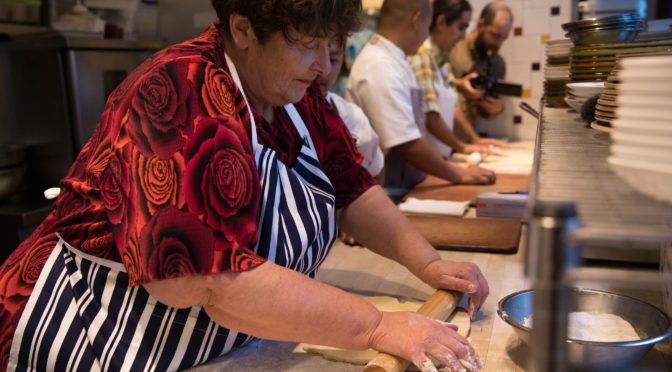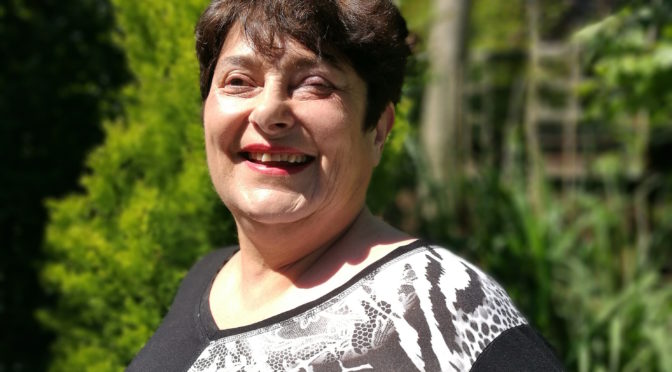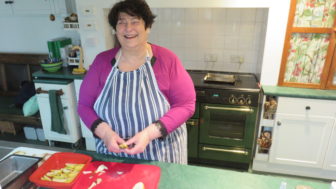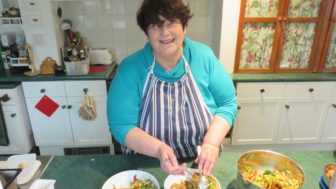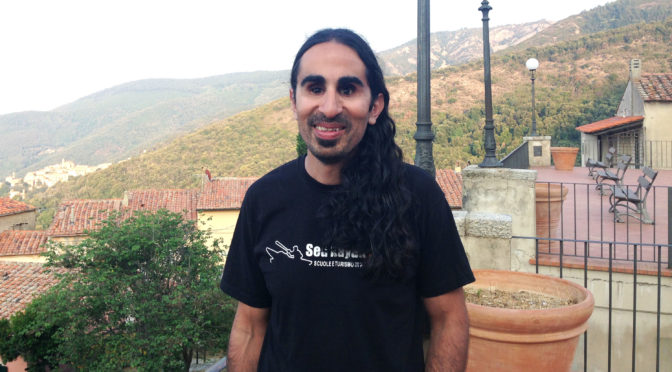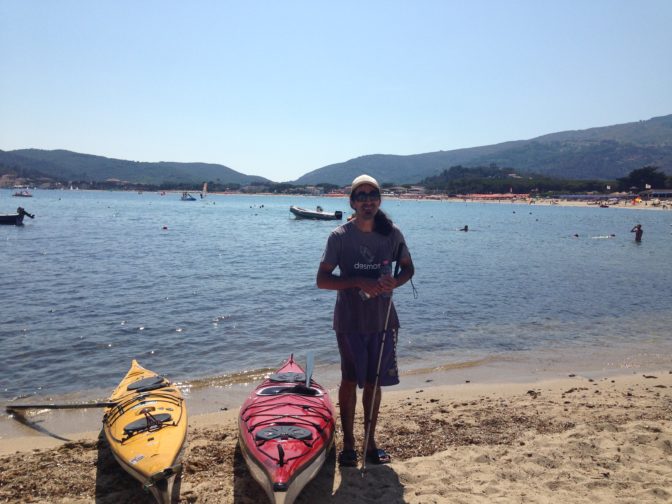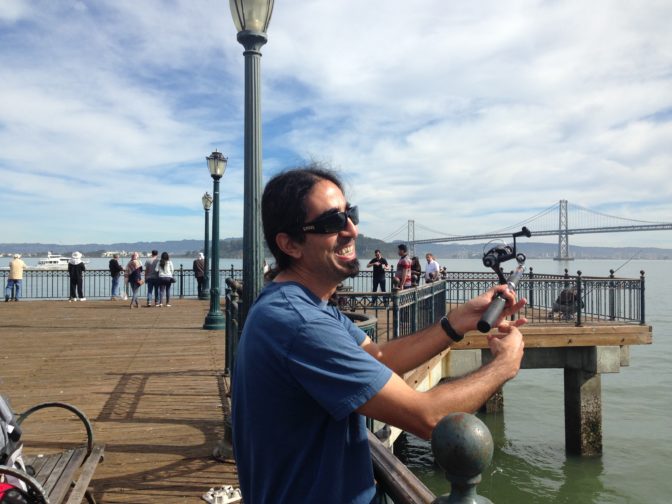Belgian-born chef and entrepreneur Noam Kostucki summed up 2017 Holman Prizewinner Penny Melville-Brown like this: “She’s bonkers. She’s completely mad.” This from a man running a restaurant in the middle of the Costa Rican jungle — but he meant it as a compliment. And for those who know Penny, it’s pretty much spot on.
Penny has big ideas and the gumption to carry them out — there’s no stopping her once she puts her mind to something. The woman has fortitude, military-learned logistics skills and an uncanny ability to connect with everyone she meets and put them immediately at ease.
From the onset, Penny’s Holman prizewinning project looked to be the one with least risk involved (compared to tending killer bees and solo-kayaking a highly trafficked shipping channel). Her plan was to leave her home in the green, port-side town of Fareham, UK and travel to six continents over the course of one year. Along the way she stopped in Costa Rica, Malawi, Australia, China and the United States, and met with chefs, other blind people and community leaders all over the world. She traveled with her nephew Toby Melville-Brown who documented her whirlwind world tour in a video blog series, Baking Blind.
“Some people were tentative and quite cagey before I showed up,” she says. “As soon as we were cooking together, they forgot I was blind. Then it was just two people sharing an experience together. Usually they had something simple in mind that they wanted to cook and I bullied them into doing something much more interesting.”
The risks of cooking seemed minimal to an experienced baker like herself— a burned wrist here, a nicked finger there — and yet somehow Penny’s project was the one with the most sturm und drang. Penny’s tour was met with much more intrigue than she had planned— coming face-to-face with Tropical Storm Nate in Costa Rica, a visa-related marooning in China, an air-sea rescue in Australia, to name a few. But Penny took it all in stride, and embraced the uncertainties as an unavoidable and rich part of her journey.
“As I crisscrossed continents and connected with people in vastly different cultures, I became even more convinced that something like this needed to be done,” she says. “There is very little media coverage of a blind person interacting with the rest of the world as an equal — an ordinary person, who is really keen on something, operating as an equal with others around the world.”
Penny has a special connection with the namesake of the Holman Prize, James Holman, a 19th Century world traveler known as the first blind man to circumnavigate the globe. Both became blind while serving in the British Royal Navy (albeit nearly 200 years apart). Penny served for 22 years in the Women’s Royal Naval Service and Royal Navy, reaching the rank of commander. She was also the first woman to hold the position of naval barrister. After being medically discharged from the Royal Navy in 1999, she created her business Disability Dynamics to help other people with disabilities find employment.
“The majority of disabled people acquire their disabilities during their working lives, as they’re growing up or while they’re working,” she says. “If you’ve build yourself the strength of character motivation, optimism, determination, those skills will take you through life’s challenges of any sort, like acquiring a disability or getting a job.”
So much of Penny’s work focuses not only on changing the minds of people with disabilities themselves, but changing widespread public perceptions about disability. And when asked to identify the highlights of her Baking Blind tour, it’s the small human connections that Penny pinpoints — the ones that ripple out into the collective psyche to help evolve peoples’ understanding of what it means to be disabled.
Her favorite moment was cooking with two 20-year-old women in China, who didn’t even know how to hold a knife — and how quickly they formed a bond and began helping each other, growing more confident with each passing moment. Or wending her way through the bush and scrubland of Kiama, Australia with an Aboriginal chef as a guide to show them which plants were edible. Or even cooking deep in the jungle of Costa Rica with Chef Noam during a tropical storm and being forced to improvise due to the ironic lack of running water.
But the end of Penny’s journey around the world didn’t turn out quite as she had expected. During a visit to France just before Christmas to explore new cooking opportunities, Penny almost died in a serious car accident where she fractured several vertebrae in her neck and broke multiple ribs and her sternum. She spent two months in intensive care and was put into an induced coma for five weeks.
Penny says, “The breathing tubes stopped me talking so communicating with the French medical team was a challenge for all of us and even more complicated by my blindness. When you’re blind and in intensive care, and trying to communicate in a foreign language, it’s not easy. I had a whole vocabulary of sound effects that I used to communicate with the nurses.”
It was an incredibly trying time for Penny and her loved ones, but Penny fought hard — facing her rehabilitation head-on, and recovering much faster than her doctors anticipated.
“When you’ve already overcome significant life challenges, you’re an old hand at it,” she says.
And though Penny still has some recovery to do, she’s hard at work producing Baking Blind videos that she and Toby shot while traveling all over the world for the Holman Prize. She’s also working on a cookbook using recipes and ideas from her world travels.
The strange lesson in all of Penny’s adventures is that the most serious mishap occurred not while she was stuck in muddy, pockmarked roads during a downpour in Costa Rica, or eating unfamiliar foods in the villages in Malawi — but while she was driving in a taxi in a major European metropolis. It goes to show that risk is unavoidable, and Penny would tell you there’s no use holding back from the things you want to seek out in the world.
“Life is all about taking risks,” says Penny. “And we survive to tell the tale.”
In little more than a month, Penny will again return to San Francisco to regale attendees at the LightHouse Gala about her accomplishments and discoveries during her year-long adventure funded by the Lighthouse’s Holman Prize.
About the Holman Prize
In 2017, San Francisco LightHouse for the Blind launched the Holman Prize to support the emerging adventurousness and can-do spirit of blind and low vision people worldwide. This endeavor celebrates people who want to shape their own future instead of having it laid out for them. In early July, we announced the 2018 Holman Prizewinners — congratulations to Stacy Cervenka, Conchita Hernández and Red Szell. Ojok and his fellow 2017 prizewinners will visit San Francisco in November 2017 to speak at the LightHouse Gala.
“We are thrilled to be able to continue the Holman Prize for a second year,” says LightHouse CEO Bryan Bashin. “These three new prizewinners represent a wide range of ambitions and life experience: from tackling social obstacles to huge tests of physical and mental fortitude, they reflect the diversity and capability of blind people everywhere.”
Created specifically for legally blind individuals with a penchant for exploration of all types, the Holman Prize provides financial backing – up to $25,000 – for three individuals to explore the world and push their limits. Learn more at holmanprize.org.

